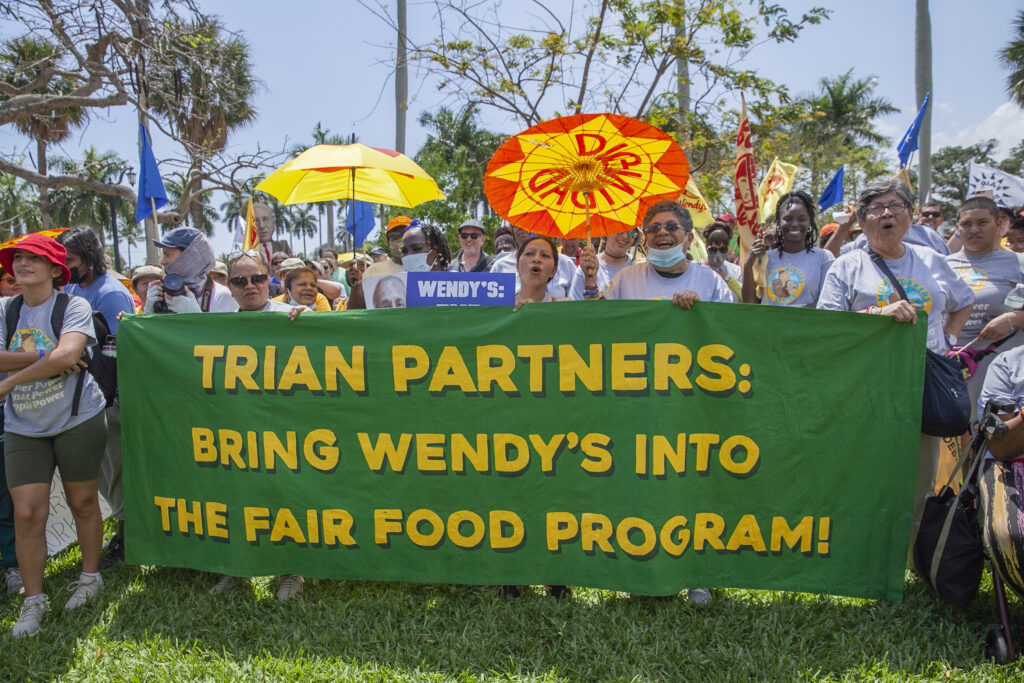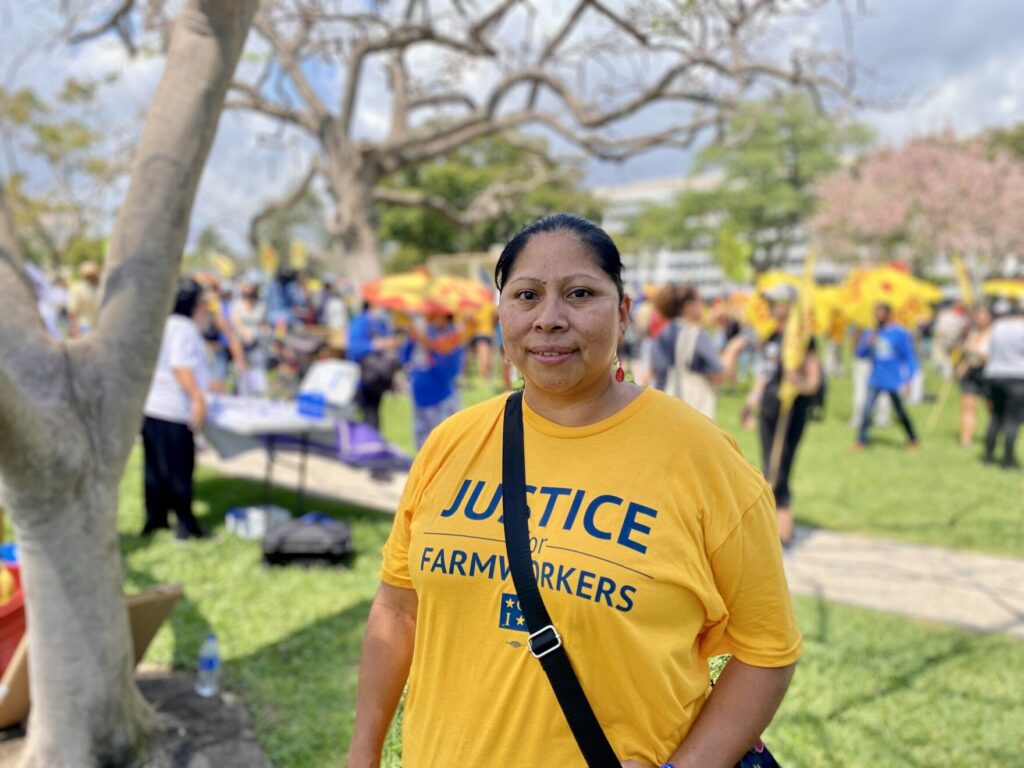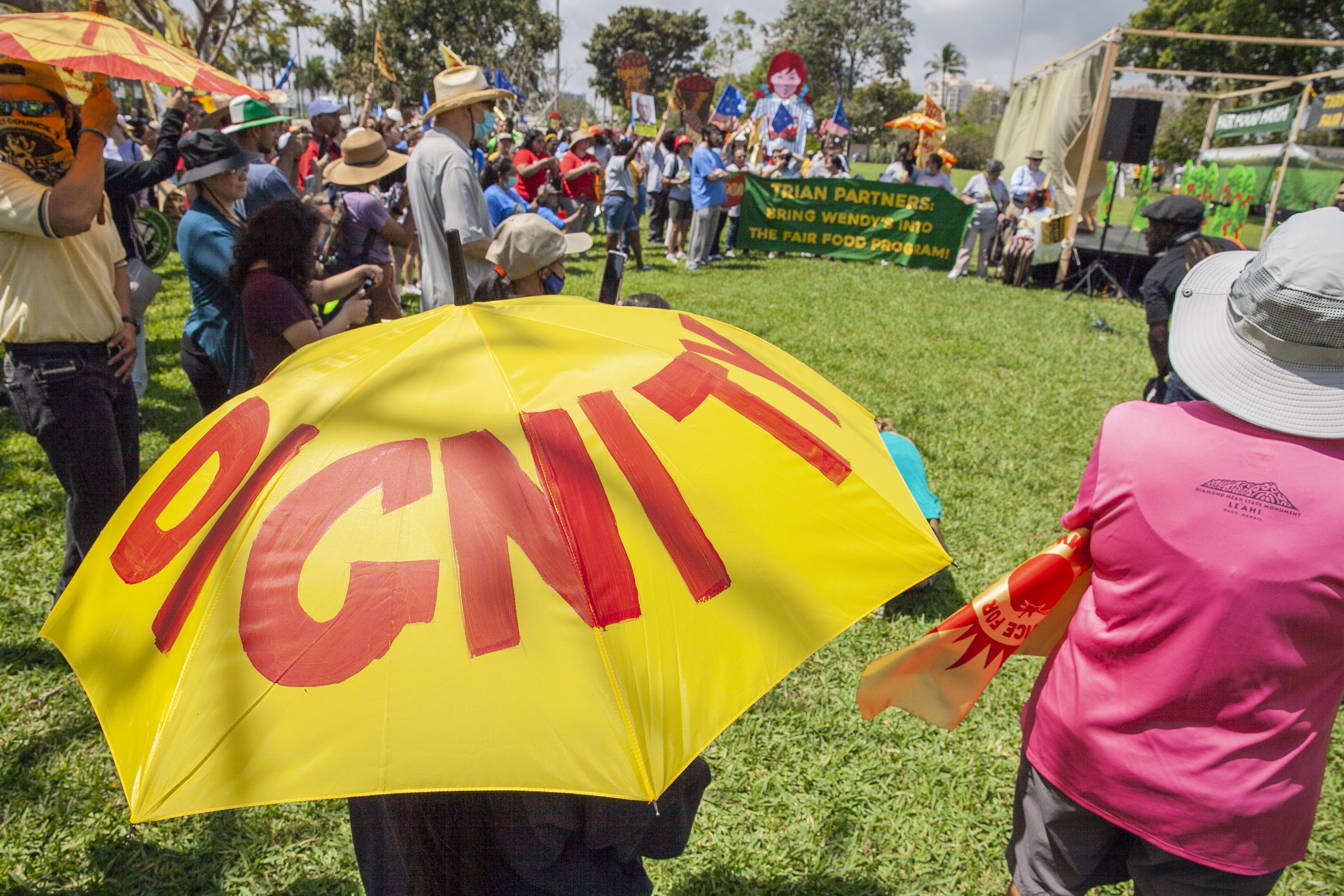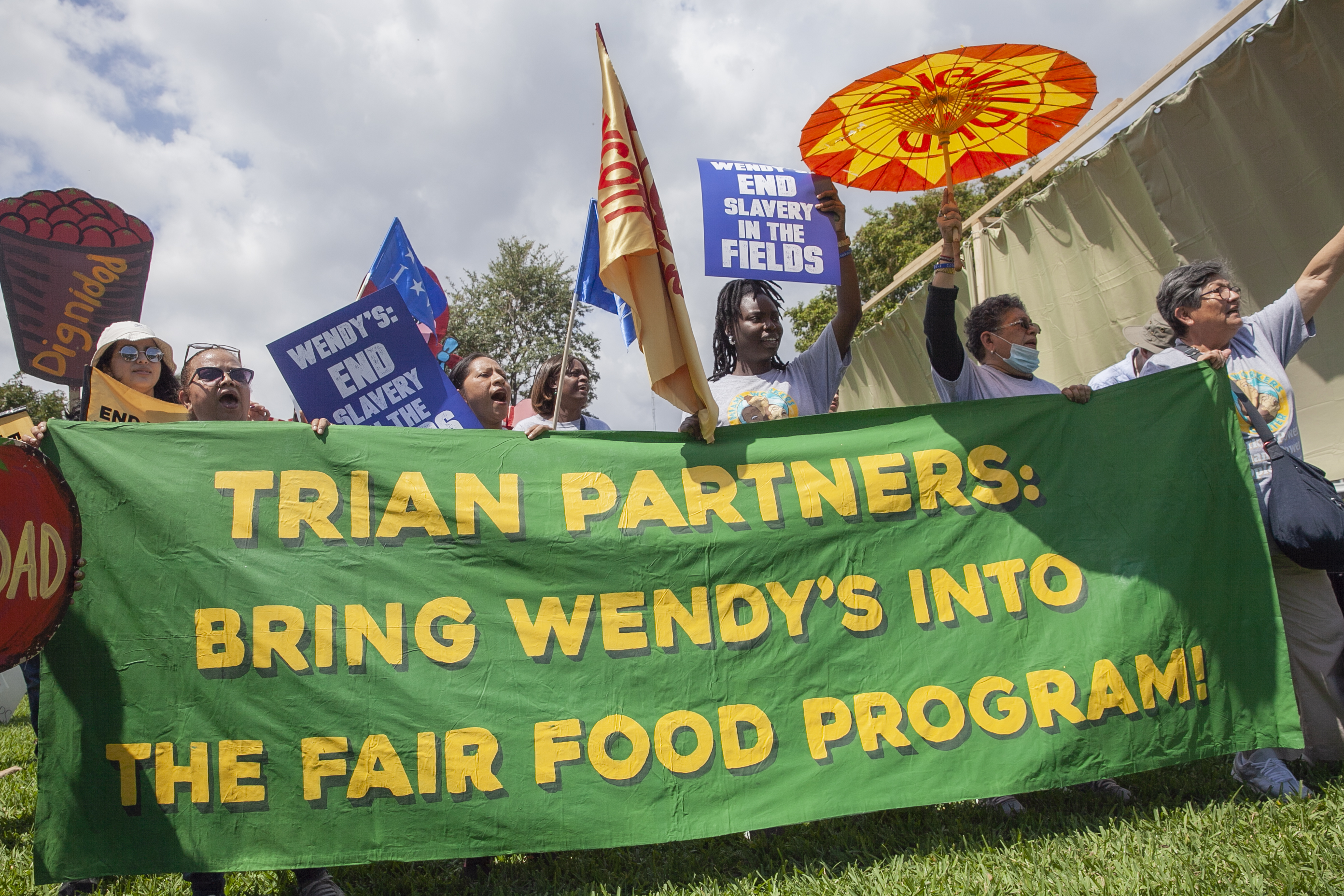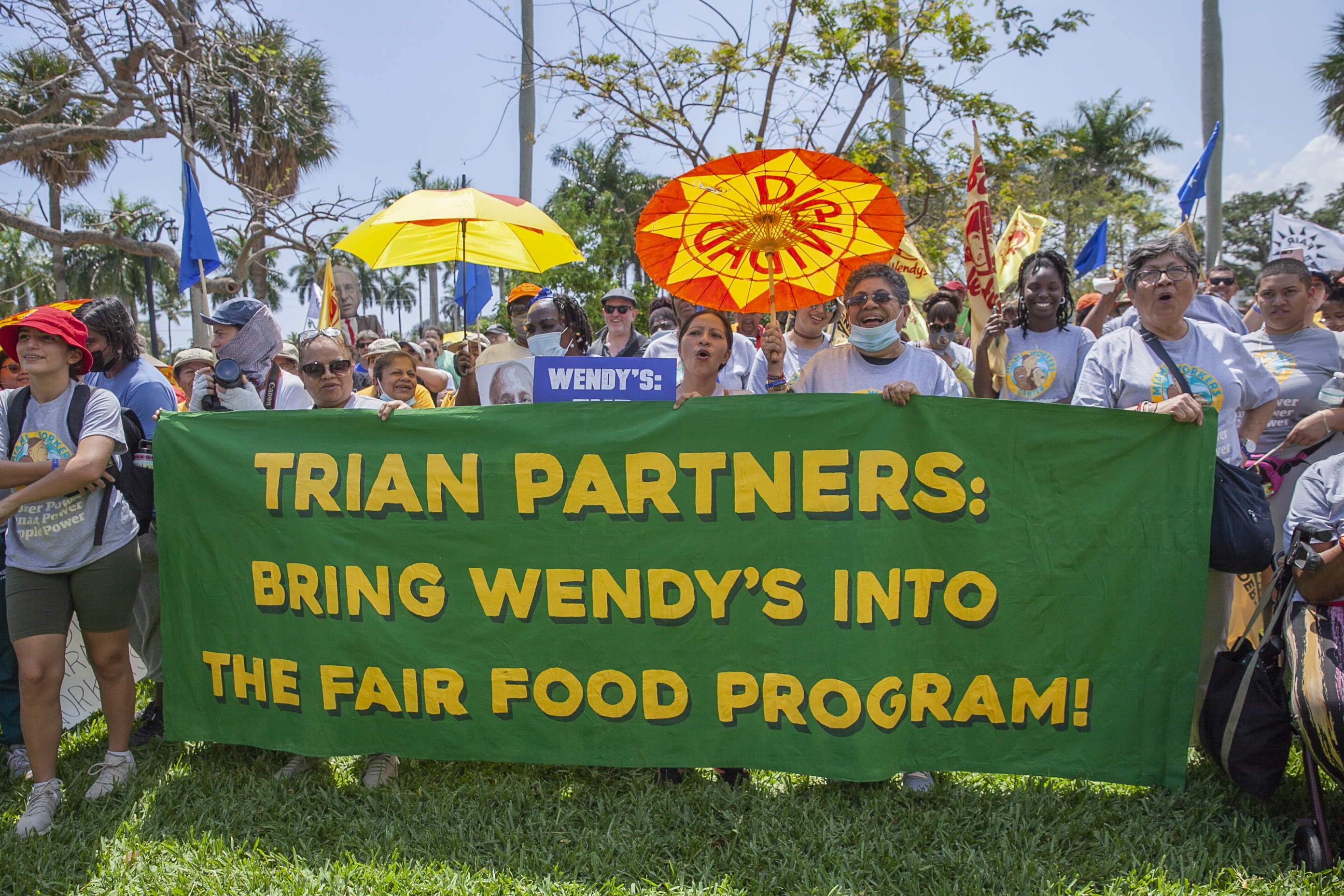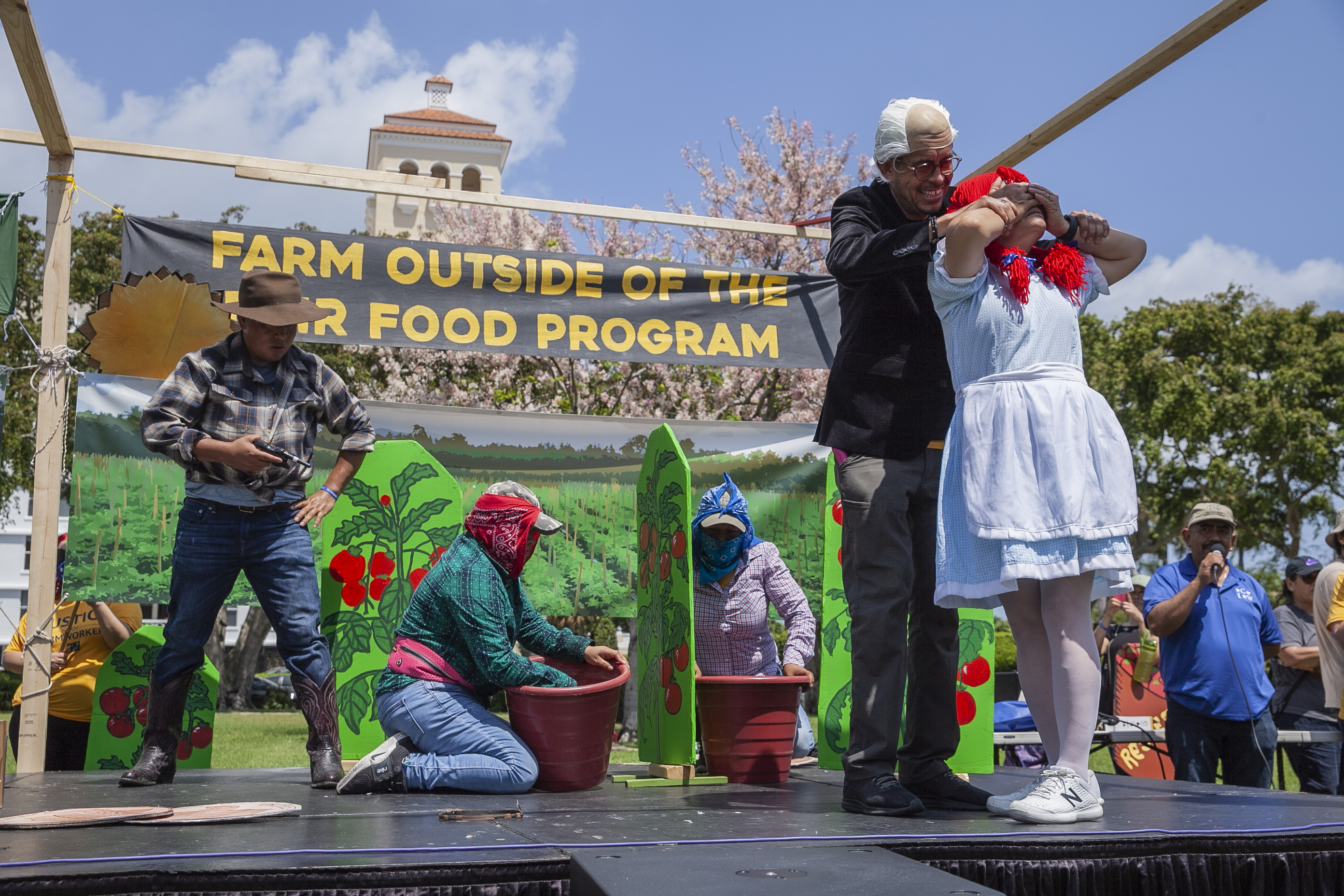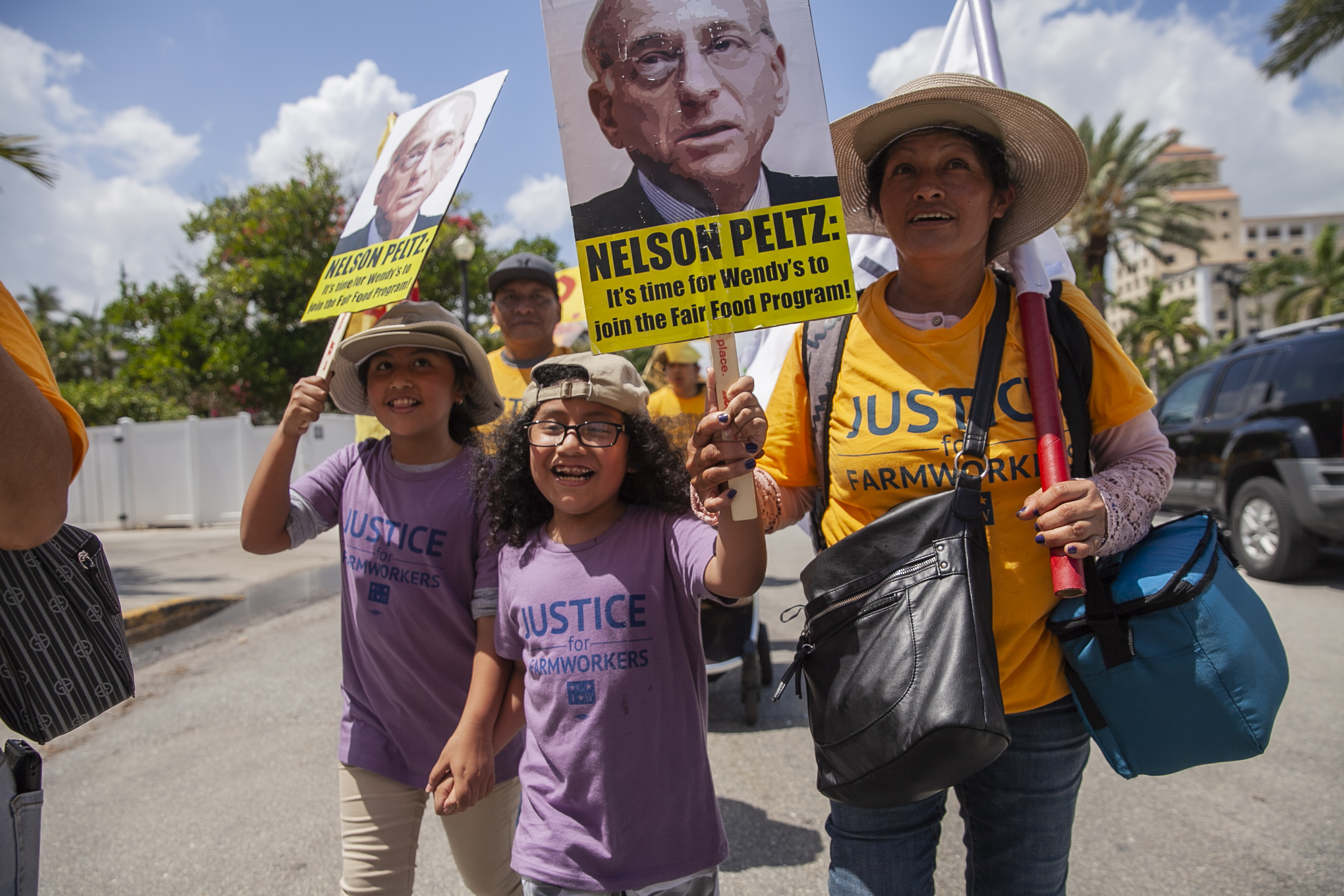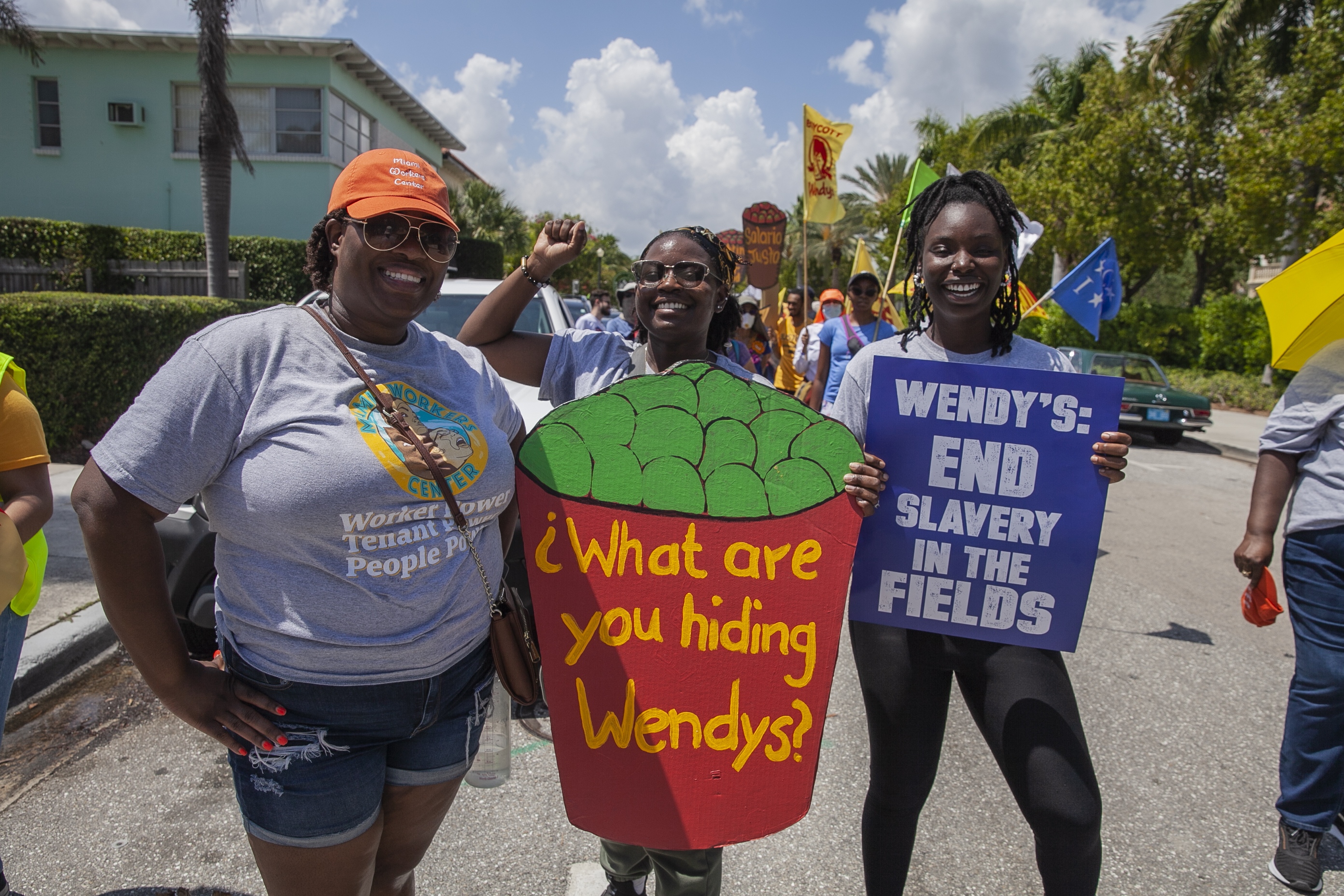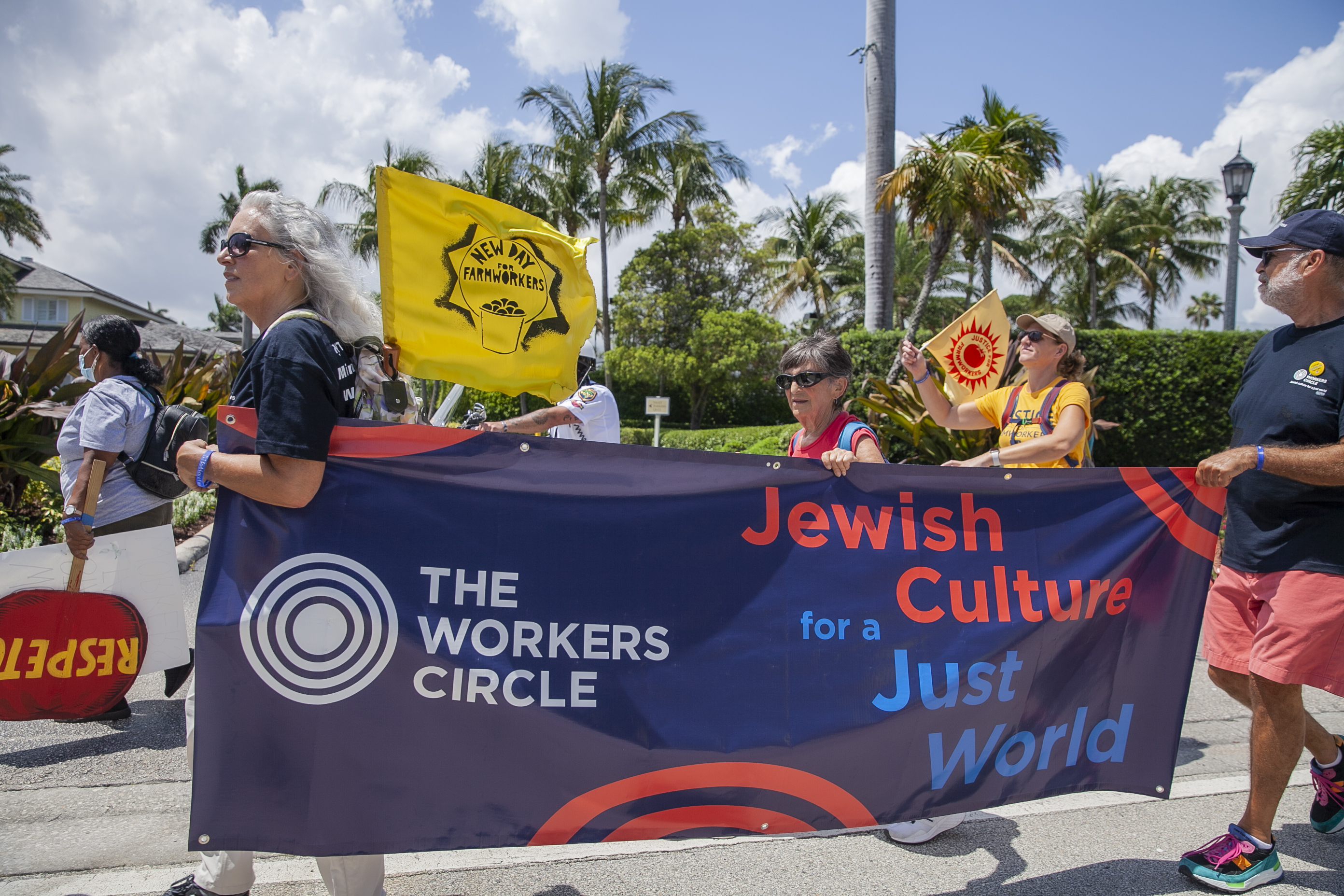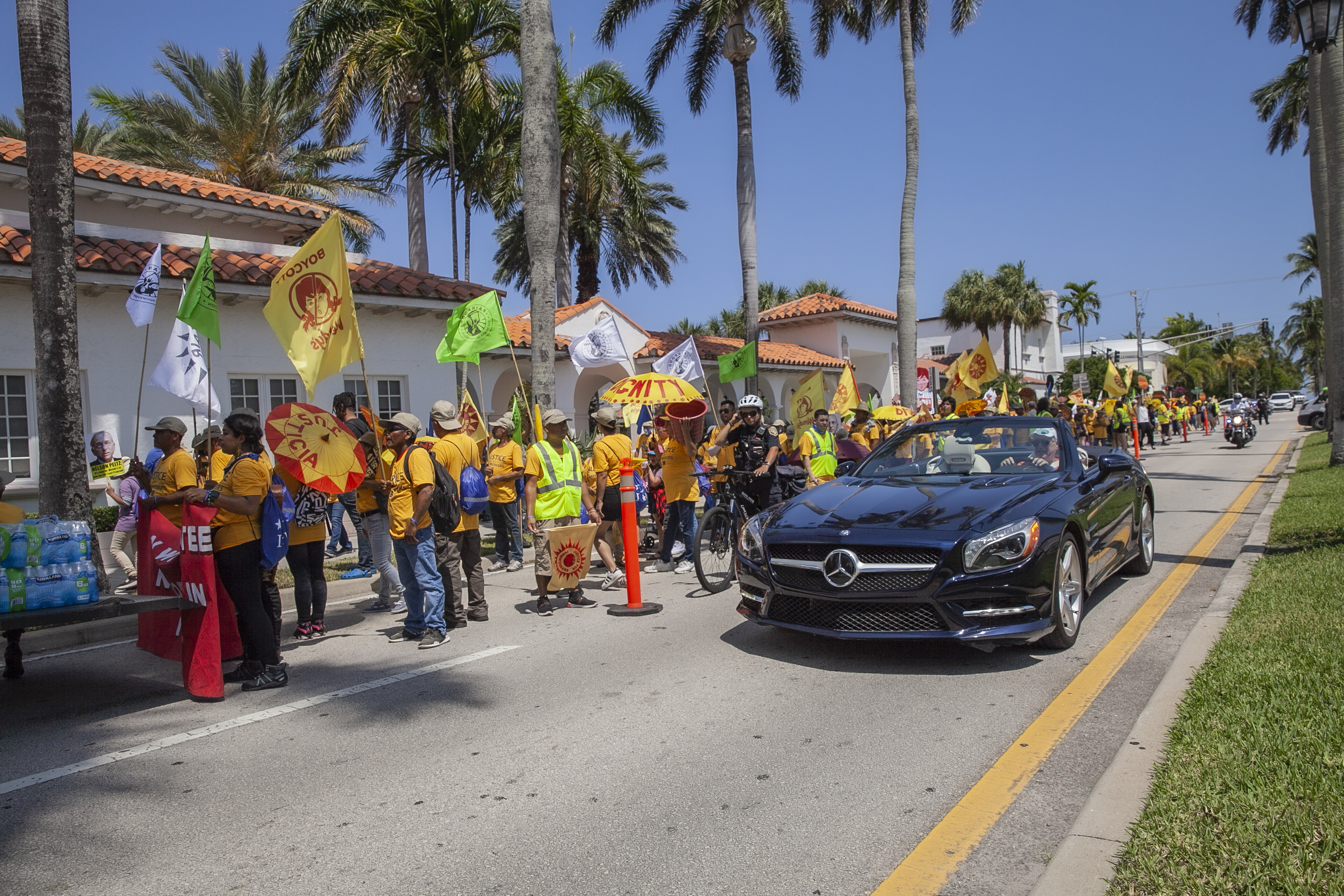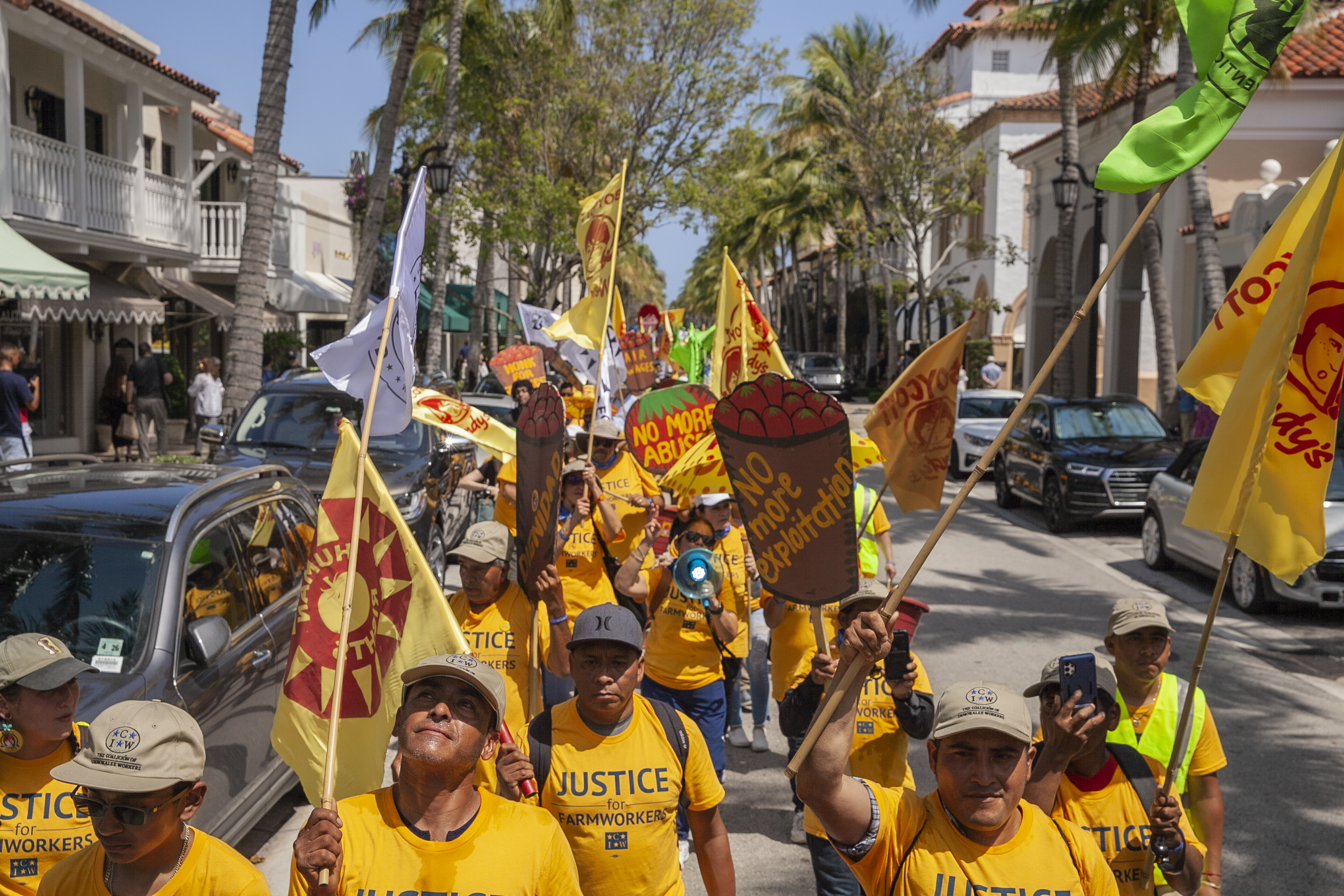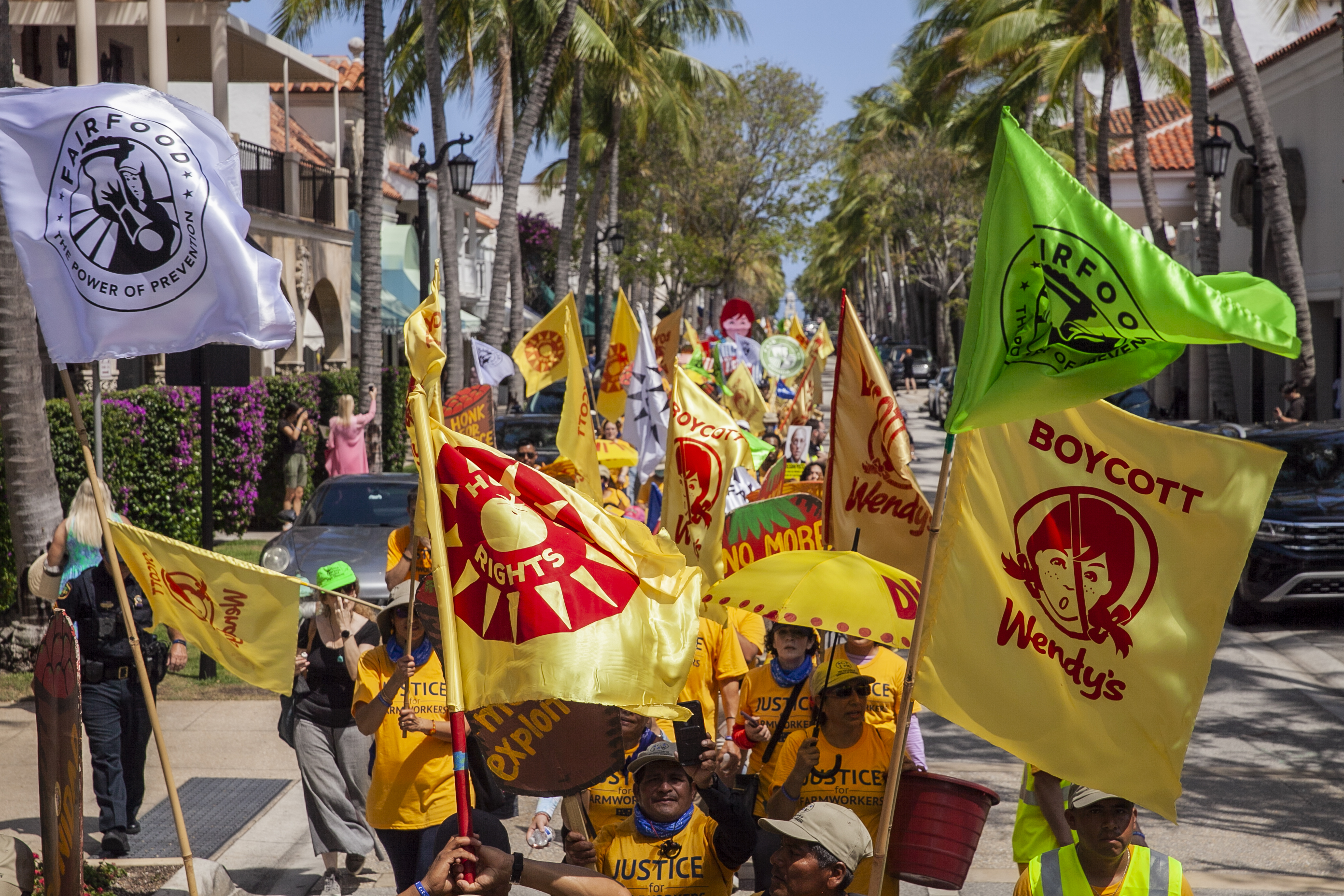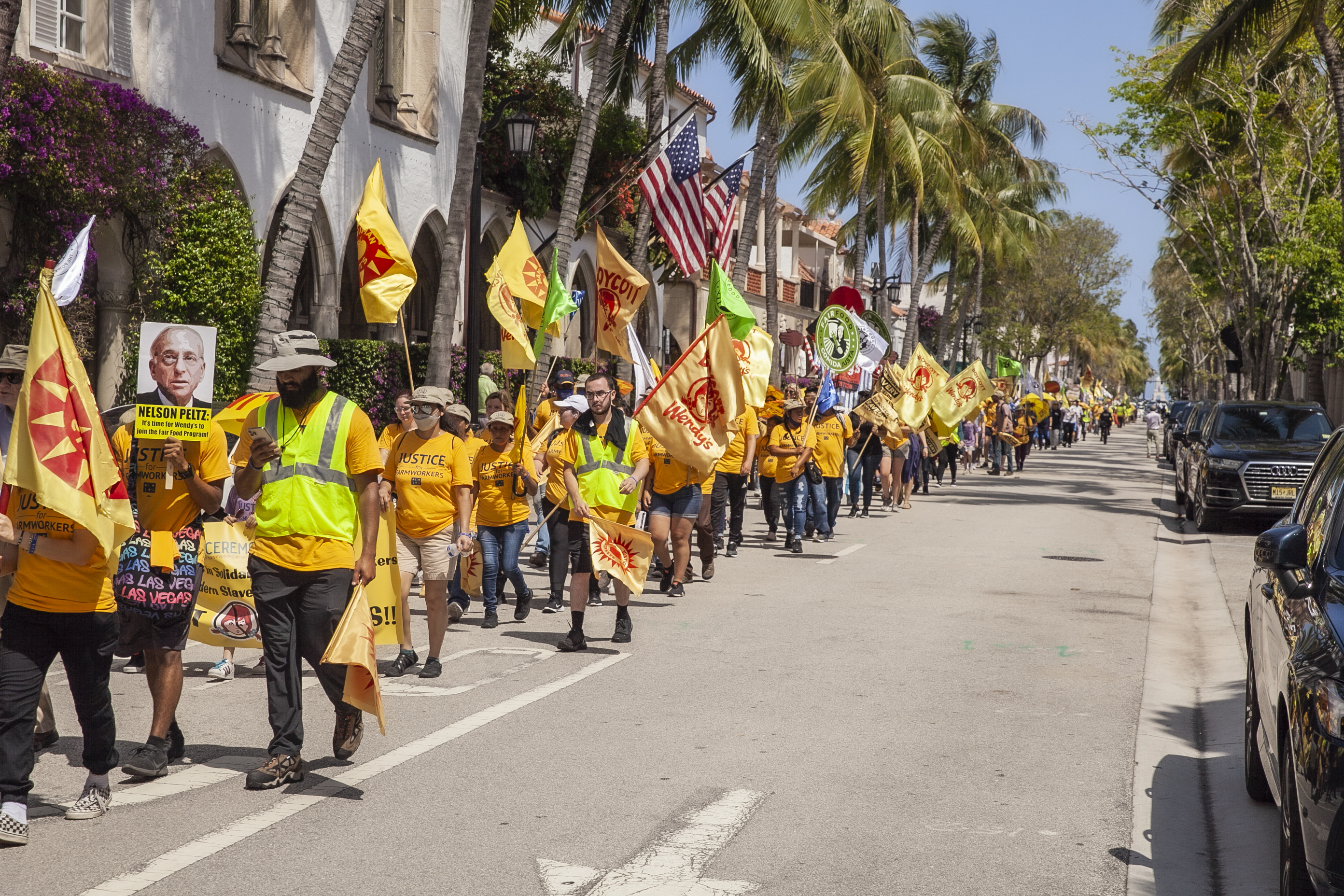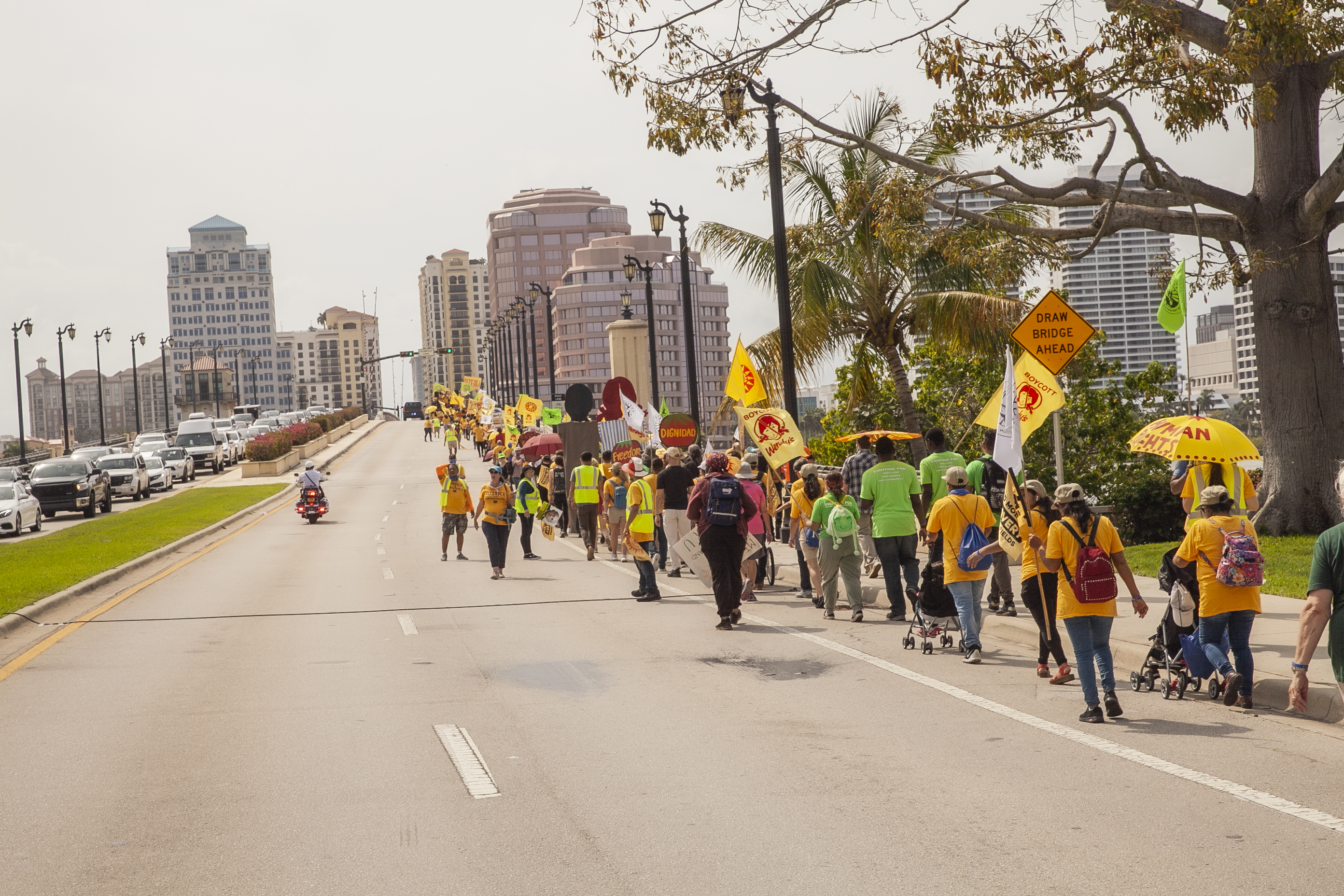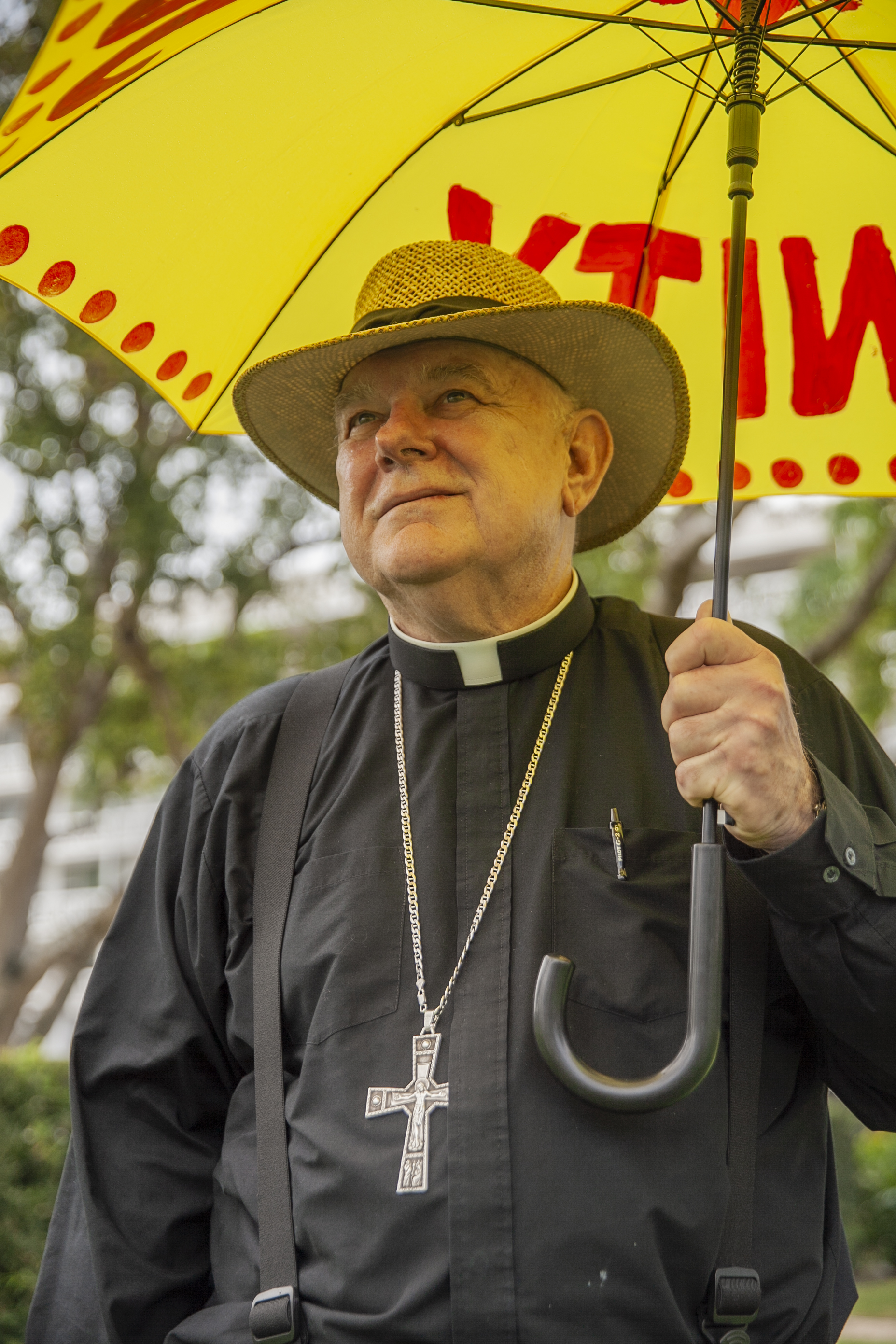Rev. Sekinah Hamlin, UCC: “We also know that before U.S. Customs and Border Protection put a hold on tomatoes from some Mexican farms, Mastronardi, a supplier for Wendy’s, purchased and imported some of the ill-gotten tomatoes. Yet, Wendy’s will not give any definitive statement that these tomatoes did not make it to their stores. The Fair Food Program would put a stop to such secrecy. We will not stop until Peltz and Wendy’s do the moral thing and join like the other major fast-food chains…”
WLRN, South Florida’s NPR station: “Wendy’s could bring their food operations into the Fair Food Program, which would urge Wendy’s to purchase tomatoes from growers who follow strict working standards…”
The unforgettable March to End Modern Slavery in the Fields is still making waves in the news! Hundreds of farmworkers and consumers sent an unequivocal message to Wendy’s Board Chair Nelson Peltz on April 2: The disturbing modern-day slavery crisis happening right now in North American agriculture can only be tackled by worker-driven solutions like the Fair Food Program, and Wendy’s indefensible decision to stand alone as the only major fast-food chain not to participate in the Fair Food Program will no longer be tolerated!
That very message reverberated through the streets of Palm Beach during last week’s epic march, and has since echoed in newspapers and on the airwaves, across the country and even overseas, to reach millions more consumers. Today, we bring you highlights from three articles that have emerged since the march, and we have included a full press list at the bottom of the post. Please keep the momentum going by sharing news of the March to End Modern Slavery in your networks!
First up, WLRN, South Florida’s local NPR station, reported on the action from Palm Beach gathering worker testimonies on why it is urgent for corporations like Wendy’s to take responsibility for the egregious abuses that persist and go unchecked in the agricultural industry and the effective mechanisms employed by the Fair Food Program to identify, address and prevent human rights violations such as wage theft and forced labor (radio story to come out soon!):
Farmworkers marched through Palm Beach, urging Wendy’s chairman to end ‘modern-day slavery’ on farms
By Wilkine Brutus, Apr 4, 2022
Farmworkers came from across the state to march with the Coalition of Immokalee Workers through the Town of Palm Beach on Saturday afternoon. They were there to urge Nelson Peltz, board chairman of Wendy’s, to join the Fair Food Program —an initiative in the tomato supply industry to improve labor standards and to protect and educates workers about farm labor abuses, such as wage theft and sexual harassment. […]
[…] The farmworkers were joined by supporters, artists and faith communities. They called on Peltz, who owns a home on the wealthy island, to follow suit with nationwide companies such as McDonald’s, Whole Foods and Walmart.
Organizers say a new code of conduct agreement would help “end modern slavery in the fields.” Lupe Gonzalo, a former farmer and one of the leaders of the Coalition of Immokalee Workers, said she wants to “guarantee human rights as dignity for workers.”
Melody Gonzalez is an advocate with the Coalition of Immokalee Workers. She helped translate during our conversation with Lupe Gonzalo in Spanish.
“It’s so important for consumers to be aware of workers rights,” said Gonzalo. “When they think about the food that’s on their table, think about ‘Where does this food come from? Under what conditions was this food harvested?’ Maybe there was slavery behind this food that they were enjoying?’”
Gonzalo, a Guatemalan mother of two, says she has worked in the agriculture industry for 12 years, picking tomatoes, apples, blueberries and other crops. Unfair work conditions is “an experience lived by farmworkers for decades here in the United States,” she said.
The Coalition of Immokalee Workers also protested in front of Wendy’s offices in New York. Peltz’ hedge fund, Trian Partners, is Wendy’s largest shareholder.
“We want Wendy’s to join the fair food program so that we can continue to expand this program. Sometimes we’re not aware of some of the abuses that are happening because there isn’t a mechanism for workers to report those problems to,” said Gonzalo. “But we know that these are abuses that are left every day in the fields. But this program ensures that there’s protections for workers against those abuses.” […]
[…] In a statement to WLRN, Wendy’s says its company “does not participate in the Fair Food Program because there is no nexus between the program and our supply chain.” Wendy’s public statement also claims that their code of conduct and social audits are an efficient way to prevent labor abuse.
Organizers say Wendy’s corporate code of conduct and its social auditing measures aren’t enough to help protect workers from labor exploitation or give them a voice.
“Now it’s very easy to go to a farm and ask if everything is OK, if other conditions are fine. And the growers, of course, are going to say that there’s no problems there,” said Gonzalo. “But with the Fair Food Program, there’s a third party monitoring system that actually works, and so they are able to go and make sure that the program is being implemented as it should.” Gonzalo says the Fair Food Program has implemented a 24-hour hotline that operates seven days a week, where farmworkers can call and “someone will speak to them in Spanish and Creole, English and several Indigenous languages.”
“And it’s not an answering machine, it’s actually a person that they can speak to and voice their concerns about.”
Gonzalo says the initiative also ensures that the workers will not face retaliation from employers for expressing their grievances. Wendy’s says it also sources its North American tomato supply from indoor, hydroponic greenhouse farms only, and that the Fair Food Program tends to operate in outdoor, conventional tomato growing environments.
But organizers say human rights protections are not specific to a type of harvest. Wendy’s could bring their food operations into the Fair Food Program, which would urge Wendy’s to purchase tomatoes from growers who follow strict working standards. […]
Next up, the United Church of Christ, put up an excellent article featuring the powerhouse Rev. Sekinah Hamlin, UCC’s Minister for Economic Justice, who gave a hard-hitting speech in support of the Wendy’s Boycott at the closing rally in Palm Beach after marching for five miles shoulder-to-shoulder with farmworkers:
Fair Food advocates target Wendy’s in a march through Palm Beach
Apr 6, 2022
Hundreds of people marched through the sunny streets of Palm Beach on Saturday, April 2, to protect the rights of the farm workers who harvest food.
The Coalition of Immokalee Workers’ March to End Modern Slavery in the Fields was aimed at Wendy’s – the only large fast-food company which has yet to join the Fair Food Program.
The Rev. Sekinah Hamlin, economic justice minister for the United Church of Christ, was one of several faith leaders who joined the protest. It meandered more than five miles through streets lined with boutiques in of one of the country’s most exclusive communities.
“As we marched down alongside the shops and golf courses of the wealthy 1 percent, people took notice and came out to video or take pictures,” she said. Hamlin noted that the protest was staged in the area near the beachfront home of Wendy’s Board Chair Nelson Peltz and other company shareholders. […]
[…] Wendy’s, in a written statement, said it hasn’t joined the Fair Food Program because its tomatoes in North America are exclusively supplied by hydroponic greenhouses. It also asserts it has its own code of conduct for suppliers.
But Hamlin and other advocates aren’t giving up. They are asking Wendy’s shareholders to call on company leaders to support the Fair Food Program.
‘Do the moral thing’
“Wendy’s said this has nothing to with our supply chain. But the pandemic has shown us we are all connected,” she said. “We know based on recent cases that modern-day slavery — forced labor — is alive and on the rise in the North American agricultural supply chain.
“We also know that before U.S. Customs and Border Protection put a hold on tomatoes from some Mexican farms, Mastronardi, a supplier for Wendy’s, purchased and imported some of the ill-gotten tomatoes. Yet, Wendy’s will not give any definitive statement that these tomatoes did not make it to their stores.
“The Fair Food Program would put a stop to such secrecy. We will not stop until Peltz and Wendy’s do the moral thing and join like the other major fast-food chains.”
Finally, Florida Catholic, the official newspaper for six of the seven Catholic dioceses across the Sunshine State, published an in-depth report of the long day of marching, focusing on the extraordinary support of religious leaders from around Florida, including Miami Archbishop Thomas Wenski, who offered a blessing to close the march:
Farmworkers, advocates take to the streets
Apr 8, 2022
PALM BEACH | There was definitely a beef with Wendy’s, but it had little to do with its hamburgers.
People of all faiths and walks of life stood in solidarity April 2, 2022, in support of farmworker rights nationwide and to persuade Wendy’s to join other food retailers, who support farmworker justice through the Fair Food Program. More than 600 people from across Florida and as far away as New York participated in a five-mile “March to End Modern Slavery in the Fields” that kicked off at Bradley Park in Palm Beach. […]
[…] Wendy’s corporate leaders were aware of the march and issued a press release explaining “there is no nexus between the program and our supply chain.”
The coalition hopes that Wendy’s will change their minds and come on board.
“Wendy’s says they can’t join the Fair Food Program because none of their current suppliers participate in the program, but that’s just a dodge,” said Yaissy Solis, a spokesperson for the Coalition of Immokalee Workers. She added Wendy’s stopped using Florida suppliers in 2015 because their farms joined the Fair Food Program.
“It’s really very simple,” Solis said. “Buying preferentially from growers who meet the highest human rights standards is how the program works to end modern-day in the fields, and that’s what the rest of the fast-food industry did when they joined a decade ago: condition purchases on fair food program participation.”
The march continued along Royal Palm Way and over the bridge to West Palm Beach and through the streets surrounded by skyscrapers and businesses then, back to the park. Along with workers and advocates from Immokalee, workers from Miami traveled north for the March, as did many farmworker rights advocates, including Archbishop Thomas Wenski of Miami. Marchers held signs urging support for the Fair Food Program, which joins workers, growers, retailers and consumers in the movement for fair treatment of farmworkers and decent wages. […]
[…] The march turned down Worth Avenue, which is famous for its fine boutiques. Shoppers came out of the clothing and jewelry stores with cellphones snapping photos and taking videos. Ladies in long sundresses who were walking small dogs stopped and stared.
People waved and clapped. Some appeared amazed but curious to know more. “What is going on?” asked one man sitting at an outside dining area having brunch.
Other residents joined the march, including Elenor Kennedy. Holding her furry little pooch on a leash, she picked up a yellow flag with the words “End slavery in the fields” and joined the marchers. […]
Below is the list of stories from the March to End Modern Slavery in the Fields that have been published so far, with more articles set to hit the digital press in the coming week!
-
Justice for Farmworkers: March urges Wendy’s to join Fair Food Program, Fox 29 WFLX (March 31, 2022)
-
Farmworkers Receive Archbishop’s Blessing of Wendy’s Protest, Sojourners (April 1, 2022)
-
Farmworkers to march in Palm Beach on Saturday; target is Wendy’s board chair, Palm Beach Daily News (April 1, 2022)
-
‘The stakes are nothing less than life and death’: Why farmworkers are marching against Wendy’s, Fast Company (April 2, 2022)
-
Farmworkers protest Wendy’s restaurants in Palm Beach, NBC 5 WPTV (April 2, 2022)
-
Hundreds rally to demand Wendy’s chairman Nelson Peltz end ‘modern-day slavery’ by joining Fair Food Program in protest outside Palm Beach offices of the soon-to-be billionaire father-in-law of Brooklyn Beckham, Daily Mail (April 3, 2022)
-
Farmworkers protest for end to ‘slavery in the fields,’ target Wendy’s chairman, Palm Beach Post (April 3, 2022)
-
Advocates for farmworker safety to march in Florida, The Presbyterian Outlook (April 4, 2022)
-
Brooklyn Beckham, Nicola Peltz Held Gallingly Lavish Wedding After ‘Slave-Labor’ Protests Against Her Dad, (April 11, 2022)
And before we wrap up, we wanted to be sure to include more stunning moments from the March captured by Miami-based photographer and filmmaker Jonathan Decamps.
That’s all for now, but be sure to check back soon with more updates from the Wendy’s campaign!

